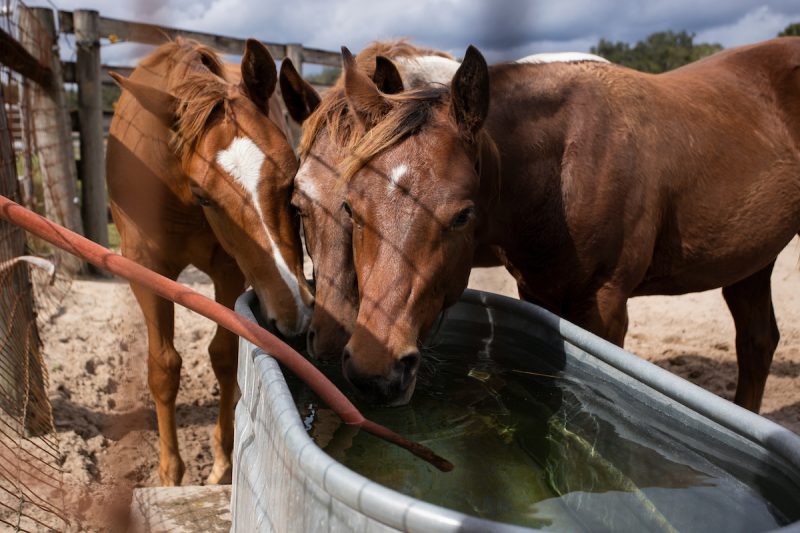
An adequate supply of fresh, clean water is essential for equine health and nutrition, especially when daytime temperatures peak above 85 degrees. Credit: Tyler Jones, UF/IFAS
Amanda Masholie, Sustainable Ag & Small Farms Agent-Walton County
When planning your equine facilities or springtime equestrian events, water is one of the most important considerations for your horses. The average 1000-pound horse in moderate temperatures consumes five to ten gallons of water per day. If you add exercise or heat to the mix, their water consumption can increase tremendously. As a horse owner, it is vital to always prioritize your horse’s water needs or potential water consumption, especially when hauling or when there is an increase in heat or activity.
One important fact to consider is that a horse may only live three to six days when deprived of water. So, as a horse owner, it is important to make sure that pastured animals always have access to clean fresh water. Fresh is always best! During times of drought, natural water sources such as ponds and streams may not provide an adequate supply. Stagnant water is not the most desired for any livestock, so a good rule of thumb to consider when choosing water sources for any livestock is, “If you would not drink it, the animal shouldn’t be expected to drink it.” Offering a supplemental source of cool fresh water is always the best option.
Some of our equine partners are very picky and will go off water when traveling, during extremes in weather changes, or during times of stress. If a new water source smells or taste differently from what they get at home, some horses will refuse to drink. One consideration is to transport water from their usual source at home. Another option might be to use a RV type water filter on the hose, if watering on the road, to help filter out some of these differences. You can also acclimate the animals to a flavored electrolyte prior to leaving home, which can be added to their water on the road or while being transported.
As an equine owner or manager, it is important to monitor consumption and make sure that water sources provided to horses are adequate. Dry forage intake and increased hay consumption in cooler weather, as well as temperatures when daytime highs are above 85 degrees, can greatly increase water requirements. Adding exercise or transport to those conditions, and the water needs increase significantly. Lack of water consumption is one of the major contributors to colic in horses, so keep ample water sources fresh and clean, and transport water from home when you have a picky horse.
- Small Farm Start Up School is Coming to the Panhandle – April 14 - January 16, 2026
- Winter Management Considerations for Horses - January 9, 2026
- Considerations for Horse Owners Responding to Recent EHV-1 Outbreak - November 21, 2025
